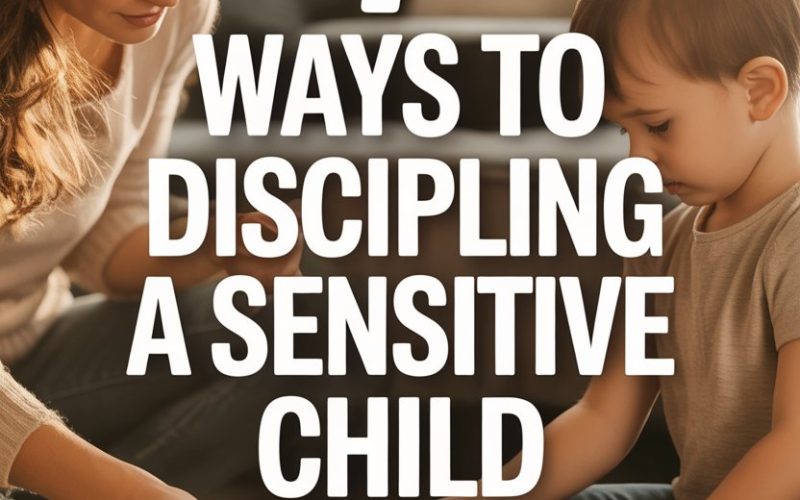Parenting a sensitive child is like trying to make a soufflé in a wind tunnel—one wrong move and everything collapses.
You want to nurture their gentle spirit, but you also need to keep some semblance of order (and your own sanity).
If you’re worried you’re one raised eyebrow away from a meltdown of epic proportions, you’re not alone.
Here are seven gentle, battle-tested approaches that won’t leave either of you in tears.
1. Respect Big Feelings Without Letting Them Rule the Roost
Sensitive kids often feel things as if emotions are dialled up to eleven. A simple “No, we can’t have lollies for breakfast” can kick off a Shakespearean tragedy.
Validating those feelings—without giving in—is the trick. Try, “I see you’re upset. It’s hard when we want sweets and can’t have them,” then hold your ground.
This approach isn’t just warm and fuzzy. Research shows that when kids feel understood, their brains are calmer and more open to learning new behaviours (source).
So, less time spent refereeing, more time actually enjoying your children.
2. Set Clear, Predictable Boundaries
Sensitive children thrive on knowing what’s coming next—surprises are for birthday parties, not discipline.
Consistency is your best friend here. If bedtime is at 8, it’s at 8. Not “maybe 8, maybe 8:15 if you ask nicely or sob pitifully.”
Writing out a simple routine or using visual charts can work wonders, especially for younger kids. The less you rely on barking sudden orders, the less likely you’ll trigger tears or confusion.
Think of it as emotional bubble wrap: they may still tumble occasionally, but the falls sting less.
3. Use Time-In Instead of Time-Out
Sensitive kids left alone with their big feelings can spiral into shame or anxiety (source).
Instead of sending them away for a “time-out,” invite them to sit with you for a “time-in.” This isn’t just a change in terminology—it’s about connection.
During a time-in, you stay close and help your child work through their emotions. “You’re having a tough time. I’m here with you.” Sometimes, that’s all they need.
And sometimes, you’ll both need a cup of tea afterward.
4. Offer Choices to Foster Cooperation
No one likes to be bossed around all day, especially kids who already feel the world acutely.
Rather than barking orders—“Put your shoes on now!”—offer choices: “Would you like to wear the blue trainers or the red wellies?”
This tiny tweak is magical. It gives your sensitive child a sense of control, which, according to child psychologists, lowers anxiety and boosts cooperation.
You’ll still get some eye rolling, but at least their feet will be clad for the walk to school.
5. Teach Emotional Vocabulary and Coping Skills
Sensitive children often need help naming and wrangling their emotions. Instead of “Stop crying!” try “Are you feeling frustrated, or is it more that you’re disappointed?”
It can feel a bit awkward at first, like you’re auditioning for a feelings-themed children’s show, but stick with it.
Labeling emotions helps kids process them. You can also teach coping skills, such as deep breaths or a “calm-down jar” (a jar of glitter and water to shake and watch).
Over time, your child learns not just what they’re feeling, but how to ride out the storm without inviting the whole neighbourhood to the thunder party (study).
6. Use Gentle, Logical Consequences
Punishments can feel catastrophic to sensitive children. That’s not discipline—that’s an emotional earthquake.
Instead, let natural consequences do the teaching, or use logical consequences that are calm and directly related to the action.
If milk gets spilled during a tantrum, the consequence is helping clean it up. No big lecture, no guilt trip. Just a, “Oops, messes happen. Let’s clean it together.”
Logical consequences teach cause and effect without unnecessary drama, and they don’t undermine your child’s self-worth (expert advice).
7. Model Self-Regulation and Apologize When Needed
Sensitive children are little emotional sponges, soaking up your moods and reactions.
When you lose your cool (and you will—nobody’s a robot), narrate your repair. “I was really frustrated and I shouted. That wasn’t fair. I’m sorry.”
According to child development experts, seeing you model self-regulation and humility teaches them how to handle mistakes and strong emotions.
Plus, you get bonus points for being an actual human being, not just the parent-police.
Raising a Sensitive Child Without Losing Yours
Gentle discipline isn’t about wrapping your child in metaphorical cotton wool or letting them run the show. It’s about helping them handle life’s bumps without bruising their spirit—or your own sense of humour.
Some days, you’ll feel like you’re nailing it. Others, you’ll wonder who put you in charge of other humans.
The good news? You’re the perfect parent for your child, sensitivity and all.
And if there’s the occasional meltdown before breakfast, at least you know you’re not alone.
Kettle on, deep breath, and try again. You’ve got this.




